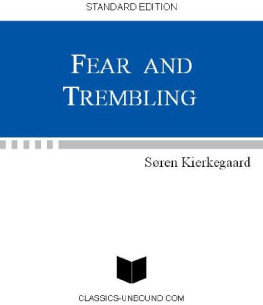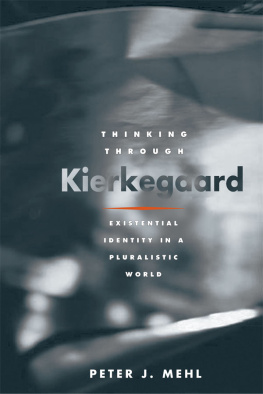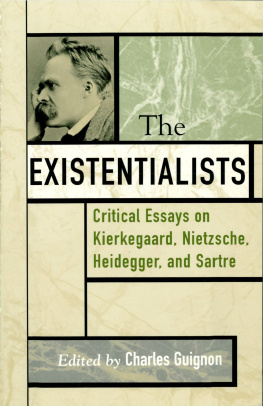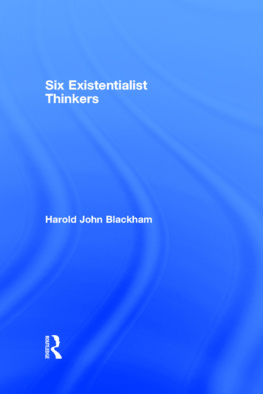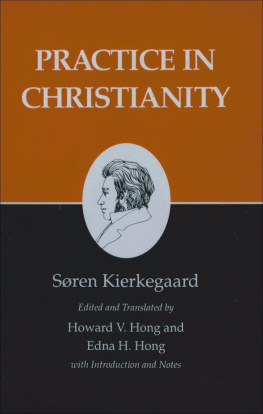THE SICKNESS UNTO DEATH
Sren Aabye Kierkegaard was born in Copenhagen in 1813, the youngest of seven children. His mother, his sisters and two of his brothers all died before he reached his twenty-first birthday. Kierkegaards childhood was an isolated and unhappy one, clouded by the religious fervour of his father. He was educated at the School of Civic Virtue and went on to enter the university, where he read theology but also studied the liberal arts and science. In all, he spent seven years as a student, gaining a reputation both for his academic brilliance and for his extravagant social life. Towards the end of his university career he started to criticize the Christianity upheld by his father and to look for a new set of values. In 1841 he broke off his engagement to Regine Olsen and devoted himself to his writing. During the next ten years he produced a flood of discourses and no fewer than twelve major philosophical essays, many of them written under noms de plume. Notable are Either/Or (1843), Repetition (1843), Fear and Trembling (1843), Philosophical Fragments (1844), The Concept of Anxiety (1844), Stages on Lifes Way (1845), Concluding Unscientific Postscript (1846) and The Sickness unto Death (1849). By the end of his life Kierkegaard had become an object of public ridicule and scorn, partly because of a sustained feud that he had provoked in 1846 with the satirical Danish weekly the Corsair, partly because of his repeated attacks on the Danish State Church. Few mourned his death in November 1855, but during the early twentieth century his work enjoyed increasing acclaim and he has done much to inspire both modern Protestant theology and existentialism. Today Kierkegaard is attracting increasing attention from philosophers and writers inside and outside the postmodern tradition.
Alastair Hannay was born to Scottish parents in Plymouth, Devon, in 1932 and educated at the Edinburgh Academy, the University of Edinburgh and University College London. In 1961 he became a resident of Norway, where he is now Emeritus Professor of Philosophy at the University of Oslo. A Fellow of the Royal Society of Edinburgh, he has been a frequent visiting professor at the University of California, at San Diego and at Berkeley. Alastair Hannay has also translated Kierkegaards Fear and Trembling, Either/Or, Papers and Journals and A Literary Review for Penguin Classics. His other publications include Mental Images A Defence, Kierkegaard (Arguments of the Philosophers), Human Consciousness and Kierkegaard: A Biography, as well as articles on diverse themes in philosophical collections and journals.
Translators Note
The translation is based on the third and current edition of Kierkegaards Samlede Vrker (Gyldendal, Copenhagen, 1963) with minor corrections to be found in the Inter Editions (Montreal) machine-readable version of the Danish text. The end-notes are in part based on those of the editors of the 1963 edition, but contain significant expansions and additions.
Introduction
The biggest danger, that of losing oneself, can pass off in the world as quietly as if it were nothing; every other loss, an arm, a leg, five dollars, a wife, etc. is bound to be noticed.
Anti-Climacus
A sickness unto death would normally be an illness that someone took with them to the grave, or more pointedly the one that took them there. In the New Testament story, Jesus raised Lazarus from the dead, thereby showing that Lazaruss own sickness unto death was miraculously now no longer so though of course in the end Lazarus presumably died like everyone else. But such fatal, or terminal, illness is not what Kierkegaards title refers to. As the author points out in his Introduction, there is a sense in which, even if Jesus had not raised Lazarus from the dead, the story implies that neither his nor anyone elses sickness is unto death. For in that story Jesus is Christ, and Christ is the resurrection and the life; so for the Christian, that is to say, for the person who believes that the historical Jesus was Christ, the Lords anointed, nothing human that ends in death comes thereby to an end. There is everlasting life.
The sickness which Kierkegaards book refers to as unto death is resistance to this belief. It is the inclination to accept that as far as the individual is concerned, death is indeed the end. Now why should Kierkegaard want to call that a sickness? After all, even in his own time there must have been people strong both in mind and body who rejected the Christian teaching of sin and salvation, and who faced what they accepted as total extinction with equanimity. And today, of course, even in societies that once proudly professed Christian principles, the rejection of Christian belief or at least the failure unequivocally to accept it is the rule rather than the exception. So in what sense can the denial of Christian dogma constitute an illness?
The aim of my Introduction is to bring out background considerations which may help readers unfamiliar with Kierkegaards writings to answer this question for themselves. It may be useful at the outset to divide the question into two by asking first: In what sense does Kierkegaard mean the failure of Christian faith to be a sickness unto death? And second: Has the diagnosis any plausibility? As will be apparent, answering the first question goes quite a long way towards answering the second. Although no really satisfactory answers may be available, raising the questions should in any case help the reader to grasp the plan and potential impact of this remarkable book. Having discussed them I shall add some comments helping to situate the book in the context of the life and work of its equally remarkable author.
In its widest sense a sickness is a disturbance in what would otherwise be a state of general well-being. The disorder might be physical or mental. The sickness which is the topic of Kierkegaards work is mental, though it is important to note that Kierkegaard actually describes it as a sickness of the spirit. To us mental illness is a familiar enough idea, very much more so than to Kierkegaards readers almost a hundred and fifty years ago. But what normally leads one to accept the categorization of a mental disturbance as sickness is the assumption that its immediate cause is something outside the patients control, as in mumps (whether or not you deliberately invite contagion), and that its subsequent history is determined by specific tendencies to chronicity, malignancy or return to health inherent in the particular disease itself. What Kierkegaard refers to as the sickness unto death, however, is a disturbance the persistence, aggravation and removal of which are matters of the patients own personal choice. One is responsible for catching the illness and according to Kierkegaard its persistence is due to ones constantly continuing to catch it.


